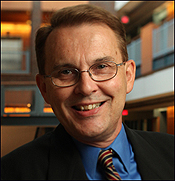Ten of 17 cross-disciplinary projects selected for the initial set of awards from Vanderbilt’s new Trans-Institutional Program (TIPs) initiative include 23 School of Engineering collaborators.

“These projects represent a broad range of research and teaching, and I’m happy so many engineers are working in such varied fields. Forging connections and building even more collaborative networks certainly reinforces the school’s institutional culture,” said Philippe Fauchet, dean of the School of Engineering.
Chancellor Nicholas S. Zeppos launched the $50 million TIPs program in November 2014 to provide support over the next five years for cross-disciplinary research and collaboration—a core pillar of the university’s Academic Strategic Plan. The 17 projects were selected from 64 formal proposals received. The funds for the first round of projects will be available July 1.
“These projects represent exactly the kind of innovation, collaboration and willingness to tackle society’s most pressing questions that we as a university community envisioned during the strategic planning process,” Zeppos said. “In these proposals, our faculty brought their passion and creativity to bear to integrate research, education and outreach in a way that aligns with our ambitions to shape the future of higher education and create world-changing knowledge.”
TIPs applicants were encouraged to identify projects that only could be pursued through collaboration and that still may be in the “incubation” phase. There was also an opportunity for existing initiatives to apply for funding that would allow these enterprises a chance to make even greater strides. While most funded proposals were new ideas, the TIPs process did make some strategic re-investments.
The 10 TIPs programs that include School of Engineering faculty participants are:
1. Advanced Neuroimaging at Vanderbilt
College of Arts and Science, School of Engineering, School of Medicine
Engineering faculty: Adam Anderson, John Gore, William Grissom
2. The Vanderbilt Pre3 Initiative (Preventing Adverse Pregnancy Outcomes and Prematurity)
School of Medicine, Peabody College, School of Engineering
Engineering faculty: Rick Haselton
3. A Trans-institutional Big Data Architecture at Vanderbilt
College of Arts and Science, Jean and Alexander Heard Library System, Peabody College, School of Engineering, School of Medicine
Engineering faculty: Aniruddha Gokhale, Bennett Landman, Clare McCabe, Robert Weller
4. ViSE – Bringing Engineers and Surgeons Together
School of Engineering, School of Medicine
Engineering Faculty: Benoit Dawant, Robert Galloway, Michael Miga, Robert Webster
5. The Science of Music Research: Creating a Program for Music, Mind and Society
Blair School, College of Arts and Science, Peabody College, School of Engineering, School of Medicine
Engineering Faculty: Philippe Fauchet
6. NetsBlox: Digital Learning Technology for Computer Science Education
College of Arts and Science, Peabody College, School of Engineering
Engineering Faculty: Akos Ledeczi
7. Sterling Ranch–Sustainability and Education Research Center
College of Arts and Science, Peabody College, School of Engineering
Engineering faculty: David Kosson, Ralph Bruce, Sanjiv Gokhale, Gabor Karsai, Xenofon Koutsoukos, Eugene LeBoeuf, Shihong Lin, Cynthia Paschal, Lori Troxel
8. Vanderbilt Center for Molecular Probes
College of Arts and Science, School of Engineering, School of Medicine
Engineering faculty: Leon Bellan
9. Wisdom Working Group
College of Arts and Science, School of Law, Peabody College, School of Engineering, School of Medicine
Engineering faculty: Doug Fisher
10. The Laboratories for Innovation in Global Health Technologies (LIGHT)
College of Arts and Science, School of Engineering, School of Medicine
Engineering faculty: Rick Haselton, Cynthia Paschal
A full listing of all participants is available on the TIPs section of the Office of the Provost’s website.